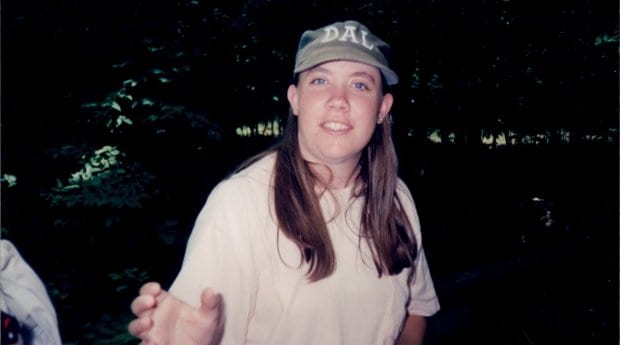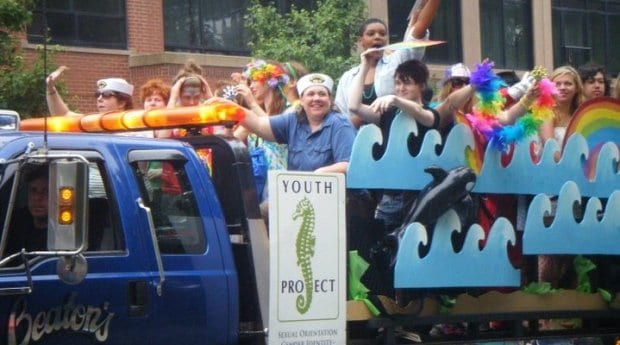
Leighann Wichman was a staunch advocate for youth rights and empowerment.
Leighann Wichman would not have liked all this attention.
“She would be frowning, pulling on her [baseball] hat,” says Chuck Moore, her longtime friend and a founding member of the Youth Project.
But since the quiet 42-year-old executive director and founding member of Halifax’s queer and transgender Youth Project (YP) died Oct 16, the accolades have been abundant. Many people flew to Halifax from Ontario and the territories; those who couldn’t travel sent notes. The funeral itself was standing room only.
This outpouring didn’t shock anyone close to Wichman. “I didn’t see her every day, but I would see what she did every day, everywhere I went,” Moore says.
YP board co-chair Lindsay Dauphinee, now 25, became involved with YP when she was in Grade 10. Dauphinee was failing school, had left home, was struggling with her mental health and “didn’t want to be alive.”
“I probably wouldn’t be here today if it wasn’t for the Youth Project and Leighann,” she says.
Wichman was the first person that Moore and his partner came out to. The couple were also the first people that Wichman, at 21, told she was gay. The trio were still not out during the summer of 1993 when they attended an anti-homophobia workshop facilitated by YP founder Maura Donovan, then a student of social work at Dalhousie University. At the time, YP was simply one support group for young gay men and one for gay women. The newly out Wichman attended Donovan’s first women’s meeting.
The YP’s community education program began in March 1994. Donovan responded to a fax from three youth at Halifax West High School requesting an anti-homophobia workshop. When Donovan, 25 at the time, met with the students, they said, “You’re kind of old. Could you bring somebody with you who is younger?” Wichman volunteered and was soon coordinating the “willy-nilly” group of youth, who gave presentations across Nova Scotia. For the first five years, the project operated without funding and out of a closet at Planned Parenthood.
Those first presentations sparked a lifelong passion for public education in Wichman; she later earned a bachelor’s degree in health education and a master’s degree in education and was the YP’s education coordinator for nine years. Wichman believed that “when you know better, you do better.”
She was involved in the Youth Project for 20 years and 11 months to the day — that first meeting was Nov 16, 1993. “She remembered what it was like to be that kid, sitting alone in your room, feeling like you’re the only queer person in the world,” Dauphinee says.
Wichman would often say that “the Youth Project always comes first,” and she meant it. Patrick Daigle, a former staff member and now chair of the YP board, recounts a year when they were struggling to balance the budget. “Leighann looked at me straight in the eyes and said, ‘Take away my RRSP contributions,’” Daigle says. He fought her on it but eventually relented (and reinstated the contributions the next year).
It was Wichman’s unshakable belief in queer youth that set her apart, says Aaron Stevens, former YP board co-chair. The idea that “queer youth really do have the power to change the world” was paramount for her. It was a faith Wichman demonstrated when she encouraged youth such as Stevens (who she co-nominated for a $70,000 TD Canada Trust scholarship) to take on leadership roles. Not one to ruminate on how far she had come, Wichman took pride in the successes — the coming outs, new jobs and graduations — of queer youth. Sometimes there was even celebratory cake.
Dauphinee says Wichman was not a maternal figure, but more a “weird, nerdy aunt.” She was obsessed with comic books, the zombie apocalypse, pop culture and (famously) pranks. Stevens recalls his first day as a summer student; Wichman was away, and the team planned to exploit her hatred of weddings. When she returned, her office had been transformed into a chapel, featuring tissue-paper stained-glass windows, a pulpit, confetti and formally attired wedding guests. The pièce de résistance was the “just married” banner and tin cans attached to her car.
This past July, Wichman told Daigle that she would leave YP in approximately one year. “She didn’t want to be the professional gay, not any longer,” Daigle says. “She wanted to be able to do something else for a while and to be known for something else for a while,” he says. “I was so happy for her.” Always a planner, she had already created a five-page to-do list.
“She was always thinking how to move things forward,” Moore says. “That’s how you go from a closet to a whole building. That’s how you go from having a phone web of young people trying to do workshops for a province to having a program.”
Since her passing, Wichman has been called a friend, a mentor, a compass, a quiet super-hero and the backbone of YP. Donovan adds another: “Over the years she just became this force.”

 Why you can trust Xtra
Why you can trust Xtra


